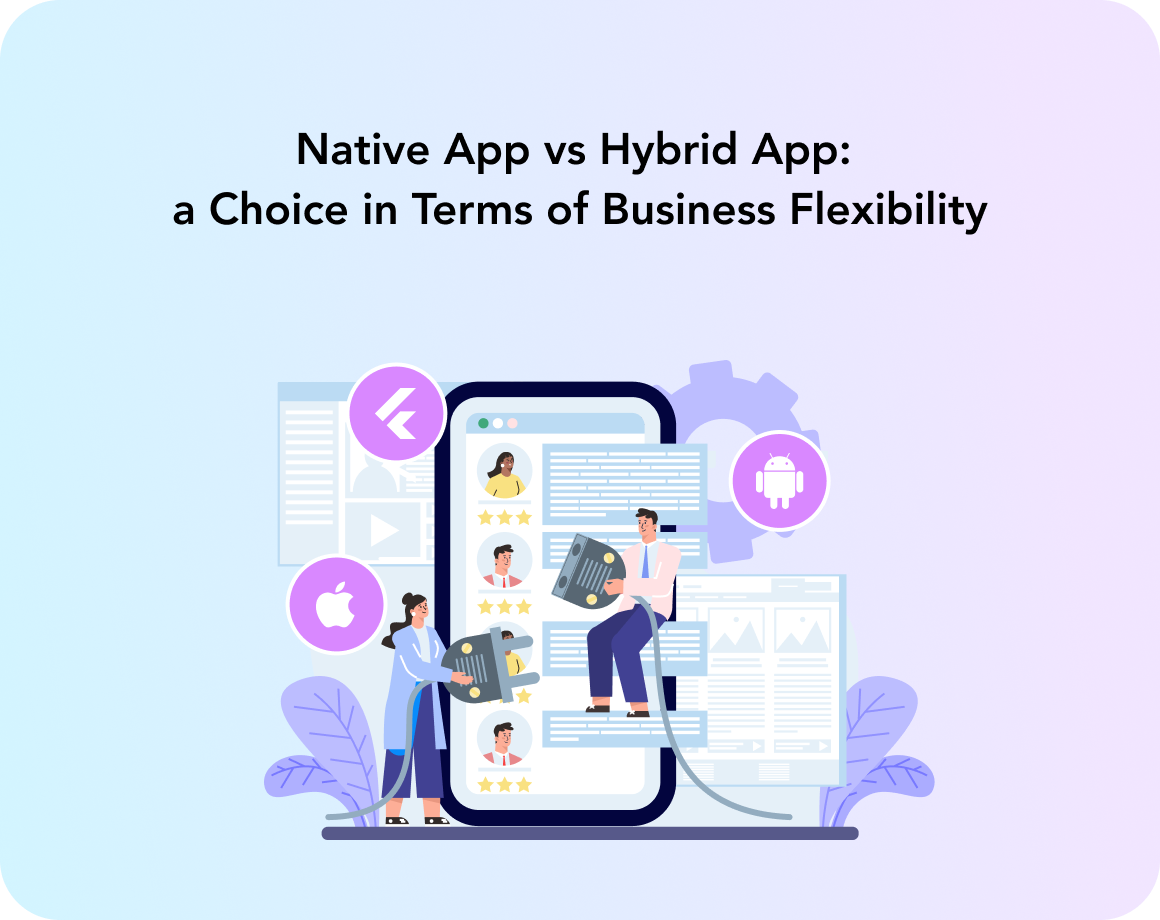Rolling out a mobile app is a predictable and intuitive way to expand on the market and offer better service for most businesses. From founding a digital startup to mid-size business digitalization, a mobile application has become a must for a successful online presence. Even small businesses are actively introducing mobile applications as 48% of those already have a branded solution.
A big question for these companies is how to build their iOS and Android apps in a cost-effective and timely manner. Hybrid app development is one of the options. Let’s compare native app vs hybrid app and review their pros and cons.
What Is a Native Application?
Native applications are specifically designed to run on a particular platform. An iOS app can’t be downloaded into an Android device and vice versa. They are written in a programming language that corresponds to the operating system of the device, such as Swift or Objective-C for Apple devices and Kotlin or Java for Android devices.
Native applications provide a superior user experience, faster processing speed, and better performance than web-based applications. They also allow direct access to the device’s features such as camera and GPS, making them ideal for more complex tasks.
Pros of Native Application
Going with native app development is a preference of many business owners as it is a straight-forward and reliable approach to getting a mobile solution. Of course, being an intuitive choice is not the only advantage of native application development.
Faster performance
When it comes to hybrid vs native app performance, native apps are faster and more reliable because they are developed for a specific platform, making them optimized to work with the hardware and software of a particular system.
Native apps run smoothly and take the least time possible to load. Natively-built solutions rarely crash and can withstand heavy flows of data, even online 3D gaming. If you need a content-rich and faster-than-lightning application, the native approach should be your first choice.
Flawless UI/UX design
Native app development makes it easier to create appealing user interfaces that maximize usability, as developers utilize native components available on each platform. Native interface components are specific for each of the platforms, making them easy to navigate and following all the standards of iOS or Android as well as the most recent mobile app UI/UX design trends.
In terms of UI/UX in native apps vs hybrid apps, hybrid or cross-platform applications need to replicate the native UI components; in other words, in a hybrid app, every interface element is just pretending to be a native one. This could lead to inconsistencies and UI flaws. Hybrid app developers have to be incredibly precise when selecting the UI components to imitate the native app as closely as possible.
Direct access to hardware features
Since native apps are designed specifically for one platform, they can directly access device-specific hardware features such as GPS or camera. Integrating hardware functionality into a native app through a dedicated API is an easy job for a developer and doesn’t cause any complications in the app’s performance.
As for the differences between hybrid apps and native apps, hybrid apps require a bit more effort to let the users open their cameras or use maps in the application. Because there are no direct APIs for accessing the hardware features from a hybrid app, developers resort to special APIs that are like a bridge between the solution and hardware. Of course, such an obstacle can lead to slower performance and small delays in accessing the functions.
Higher security
Security is paramount when it comes to both native and hybrid mobile applications, and native applications provide added security thanks to their integration with built-in secure operating systems like iOS or Android platforms.
Native apps have to follow platforms’ standards, including security. Native code, written in Swift or Kotlin, is known for higher security. Add reliable data encryption and platform-specific security measures, like Face ID and two-factor authentication, and native apps have layers and layers of security. Unfortunately, hybrid apps cannot boast such protection because of their web nature.
Groundbreaking features and extensive documentation
With native application development, iOS and Android developers are the first to enjoy the new features and improvements in the software. The day, let’s say, Apple, releases a new version of Swift with cutting-edge approaches to programming and useful APIs, developers can start testing it right away.
Hybrid app developers need to wait for their chosen programming environments to catch up with updates and introduce new features. After all, hybrid apps are replicating the native solutions so it takes time to make a copy of a new functionality.
Native app development also wins with its direct backing up from Apple and Google. The companies give developers lots of detailed documentation on each aspect of their coding journey. Additionally, iOS and Android developers have active communities online to exchange knowledge and tackle tricky tasks.
Cons of Native Application
Native app development sounds like a win-win for both developers and business owners. It’s true: this approach offers a variety of opportunities for creating high-performance apps. Still, there are some limitations to consider before choosing whether to develop a native app or a hybrid one for your project.
Longer development time
If you are looking to enter both Google’s Play Market and Apple’s App Store, one hybrid or cross-platform app can be enough to state your presence as these solutions can run on both iOS and Android with one codebase. One of the most significant differences between hybrid vs native applications is that native development requires working on two separate applications.
As a result, you will need two specialists to develop the applications. While they can work on the apps simultaneously, the process of developing a mobile app for startups tends to take longer for the native approach.
Higher app cost
Based on the previous disadvantage, you can guess one more: building two separate apps is more expensive than one. This simple fact might be a major decision-making point for many small businesses and startups.
More complex maintenance
Taking care of the post-launch maintenance of two separate codebases is more complex and time-consuming than one shared web-based application. Sooner or later some necessary updates will be needed, from removing bugs or scaling up to simply exchanging older technologies for something with better performance. If with a hybrid app you can go to one developer to review the solution, the native applications will require two developers to take a look.
What Is a Hybrid Application?
A hybrid application is a type of mobile application that can run on a variety of platforms, from iOS and Android to web browsers. The nature of a hybrid app is rather simple: it is a web page wrapped in a native shell. Hybrid applications are written with web-based languages, like HTML, CSS, or JavaScript. Any of such solutions has an embedded browser, meaning that what the user downloads is not really an app in its essence but a web page mimicking a native app.
A hybrid application has not so much of the native code in it: its backend is fully web-based with components reaching out to the device’s hardware and frontend replicating the native look & feel.
Pros of Hybrid Application
There are a number of reasons why business owners resort to hybrid app development.
Cost-effective app development
The main motivation of business owners to consider getting a hybrid app is its cost-effectiveness. Those willing to present both iOS and Android apps won’t have to budget for two applications as one hybrid solution is enough to cover iOS, Android, and web platforms.
Faster time to market
When choosing between native and hybrid apps, remember that hybrid app development offers one more significant advantage: fast development. With one codebase for all platforms and an overall simpler web development flow, you can roll out a hybrid app way faster than a native one. A perfect choice for those building MVPs or marketing apps needed here and now.

Wider user reach
Hybrid applications are web pages in their nature, just wrapped in a native shell to make them identical to the native iOS and Android ones. This difference between hybrid vs native applications not only makes the app cross-platform and easier to build but allows the business owner to reach one more platform, which is web browsers.
Of course, a web app isn’t of the same effect as a downloadable, usual application, but it’s a great option for marketing, short-term activities. A web app can be viewed as a landing page for users to view content in-browser instead of downloading the application onto their devices.
Cons of Hybrid Application
The somewhat simplistic build of a hybrid app has its strengths and weaknesses. Being a web-based application carries a set of limitations to it.
Limited functionality and UX customization
There are significant distinctions between hybrid and native apps in terms of feature variety and UX consistency. With web programming languages and an array of necessary APIs and plugins to replicate the basic functionality of a native app, bundling a solution with a more complex feature set might be a time-consuming and not-so-rewarding process.
There are some functions that hybrid apps simply can’t produce because of the programming language and the structure of an application. Additionally, hybrid apps have trouble introducing a consistent UI. While for a simpler solution, a hybrid UI is not so different from a native one, the more complex the app gets, the bigger the gap between native and hybrid UI is.
Slower performance
As for the performance speed in native app development vs hybrid app, because each of the native functions needs to be accessed through dedicated APIs, plugins, and bridges, every additional feature will be slowing the hybrid application down. The more complex, the slower: that can be the motto of a hybrid app.
Plus, a hybrid application cannot directly access any of the hardware functions of a device, so for each of those an additional plugin is a must. Such a process slows down the app’s performance too.
Native or Hybrid: Which is Better to Choose for your Business?
Having considered all pros and cons of each of the development approaches, it’s time to make the big decision: is it native or hybrid app development for you? To make the decision-making easy for you, we prepared a comparison of hybrid apps vs native apps and answered the question of when to choose native app development and when — hybrid.

When to choose a native app development
Native app development should be a priority for those business owners looking for a high-performance, quick app that can handle big volumes of data or heavy graphics. Native applications are an intuitive choice as the programming languages, such as Kotlin and Swift, are created precisely to let developers build flexible, consistent, and well-performing solutions. Google and Apple are constantly updating their app development environments, so a native app will feature all the newest updates and cutting-edge technologies.
When to go for a hybrid app development
A hybrid app development is a go-to choice for those in need of speedy and budget-friendly application development. The functionality scope of hybrid apps is rather limited as this type of application’s main goal is to replicate a native app through a shell and a set of extra tools. The need for APIs and plugins slows down the app's performance. Hybrid development can be a good choice for a simple, short-term solution, for example, a marketing application or MVP.
Consider Perpetio Your Trusted Partner

We at Perpetio specialize in full cycle mobile app development. Because our top priority is a high-quality and well-performing application, we give preference to native and cross-platform app development approaches. If you are on a tiger budget, we recommend you consider cross-platform app development with the Flutter framework instead of a hybrid approach. While still being a cost-friendly and time-effective solution, cross-platform app development offers a higher quality of applications that in most cases cannot be told apart from a native one.
Final Thoughts
The difference between hybrid and native apps comes down to the priorities a business owner has. Based on what you are looking for in your future application, you can either go with a native app for a high-performing, feature-rich solution or a hybrid app for a faster and more cost-effective development flow.
Whether you decide on native or hybrid mobile apps, a reliable team on your side is a must for a successful launch. Perpetio is open to new mobile app development projects and your success story can be the next one.
FAQ
What are some examples of native apps?
Some of the famous native apps are WhatsApp, Spotify, and TikTok.
What are some examples of hybrid apps?
Some of the popular hybrid apps are Amazon, Twitter Lite, and Evernote.
What is the most popular native app framework?
Native apps are built using Kotlin and Java programming languages for Android as well as Swift and Objective-C languages for iOS.
What is the most popular hybrid app framework?
Hybrid apps are built with CSS, HTML, and JavaScript programming languages.
Which is easier to maintain native apps or hybrid apps?
When it comes to hybrid vs native app maintenance, updating a hybrid app is easier because the development team needs to review only one application instead of two native ones.
Should I go with native or hybrid mobile apps?
The choice of a native app vs hybrid app depends on your business needs: go for a native app if you need a feature-rich, complex solution; choose a hybrid app if you need a budget-friendly solution in the shortest time.






